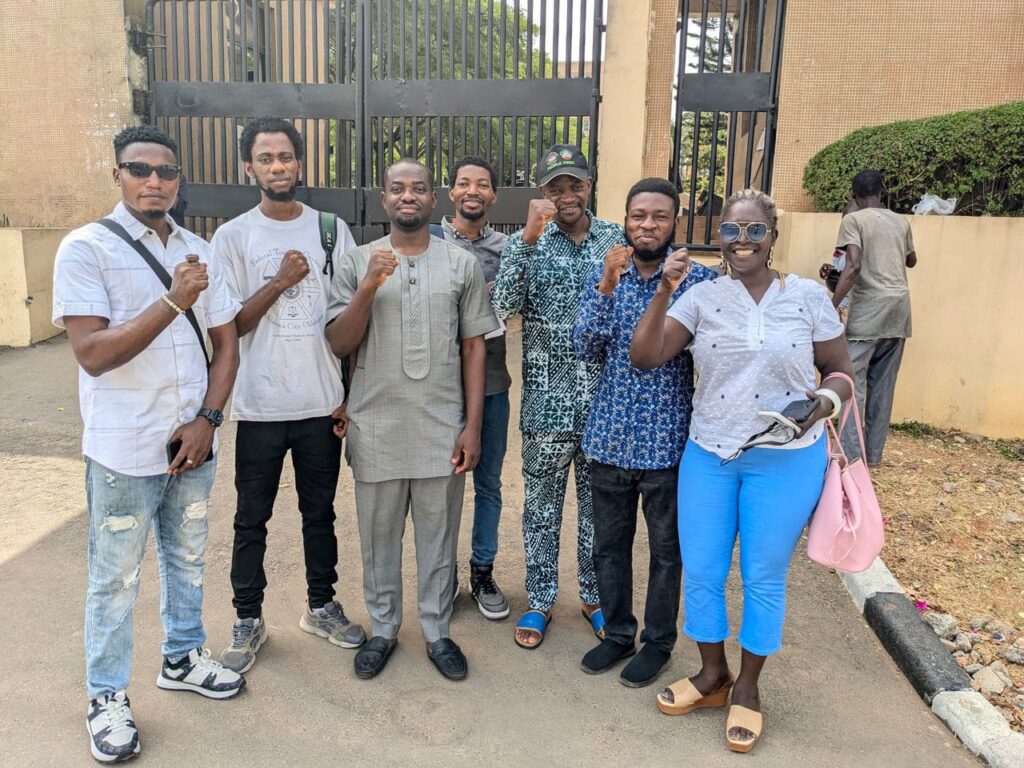Justice Delayed: The Prolonged Trial of the 11 #EndBadGovernace Activists!
By Abdullahi Bilal
The case of the 11 activists arrested during the #EndBadGovernance protest has faced multiple adjournments and was once again postponed on March 26, as Justice Emeka Nwite was absent at the Federal High Court in Abuja. The case has now been rescheduled for June 25, 2025.

The protracted legal proceedings involving the “Abuja 11″—activists arrested during the August 2024 #EndBadGovernance protests is a significant concern regarding judicial delays and the suppression of dissent in Nigeria. These individuals were abducted in coordinated raids at various locations, subjected to torture during detention at the Intelligence Response Team (IRT) facilities, and subsequently remanded to Kuje Prison under stringent bail conditions. Despite meeting these conditions, their trial has faced continuous postponements, raising serious questions about judicial impartiality and state repression.
The Abuja 11: Who They Are
The activists, known as the Abuja 11, include: Akande Daniel, Adaramoye Micheal Lenin, Mosiu Sodiq, Angel Love Innocent, Adeyemi Abiodun Abayomi, Buhari Lawal, Bashir Bello, Suleiman Yakubu, Opaoluwa Eleojo Simon, Nuradeen Khamis and Abdulsalam Zubairu
These individuals participated in peaceful protests against economic hardship, political repression, and bad governance under President Bola Tinubu’s administration. Instead of being heard, they were met with violent crackdowns, unlawful detention, and trumped-up charges designed to silence them.
Series of Adjournments
The trial of the Abuja 11 has been marred by repeated adjournments:
* November 8, 2024 – The initial trial date was postponed because Justice Emeka Nwite was reportedly attending a conference.
* January 29, 2025 – On the rescheduled date, the judge was once again absent, this time the Judge is said to be on leave.
* March 26, 2025 – The latest adjournment came after it was revealed that the court would not be sitting from March 24 to 27. The defendants were informed only a day before the scheduled hearing.
Now, a new date—June 25, 2025—has been set, but expectations are already mounting that further delays will follow. These deliberate postponements have left the defendants in limbo, subjecting them to continued psychological and emotional distress.
Severe Charges and Potential Penalties
The Abuja 11 face politically motivated charges, including treason, terrorism, mutiny, and conspiracy—offences that carry the possibility of a death sentence. Even Human Rights Watch has noted that these charges stem from their participation in peaceful protests and the promotion of the #EndBadGovernance hashtag.
Despite the severity of the accusations, no concrete evidence has been presented to link them to any acts of treason or terrorism. These baseless allegations are clearly designed to intimidate and silence not only the accused but all Nigerians who dare to challenge the state’s failings. The real crime in the eyes of the government was their vocal opposition to the disastrous policies of President Bola Tinubu’s administration, which have only deepened economic hardship for the people.
For nearly a year, the Abuja 11 have endured state repression. Their harsh bail conditions placed enormous financial and emotional burdens, that was struggled to meet the court’s demands.
This is part of a broader strategy by the government—using the legal system as a weapon to crush dissent. By dragging out this case, they are sending a chilling message to all Nigerians: protest at your own risk. But the resistance continues.
Call for Judicial Accountability
The repeated adjournments and delays in this case raise concerns about the pace of justice. The continued postponements, including the absence of Justice Emeka Nwite on multiple occasions, have prolonged the trial process. Such delays not only affect the accused but also risk diminishing public confidence in the judicial system.
The Nigerian Bar Association (NBA) and other judicial oversight bodies must act. This is not just about the Abuja 11—it is about the integrity of Nigeria’s legal system. If the courts become tools of oppression, then justice itself is under attack.
Amnesty International has reported that Nigerian security forces used excessive force during the protests, resulting in at least 24 deaths and over 1,200 detentions, including minors. Such brutality violates fundamental human rights and democratic principles.
Nigeria is rapidly descending into a police state where peaceful protest is treated as a crime. This should concern everyone, as it sets a dangerous precedent for how the government responds to dissent in the future.
The case of the Abuja 11 calls for urgent need for judicial reform and the protection of civil liberties in Nigeria. The international community and human rights organizations must increase pressure on the Nigerian government to end these politically motivated trials.
We demand:
1. The immediate and unconditional dismissal of all charges against all innocent protesters across the country.
2. The judiciary must not be used as a tool for repression.
3. Security forces involved in human rights violations during the protests must be held accountable.
This is not just about 11 individuals; this is about the right of all Nigerians to protest, to demand better governance, and to live without fear of persecution. We must stand together in the fight for justice.
